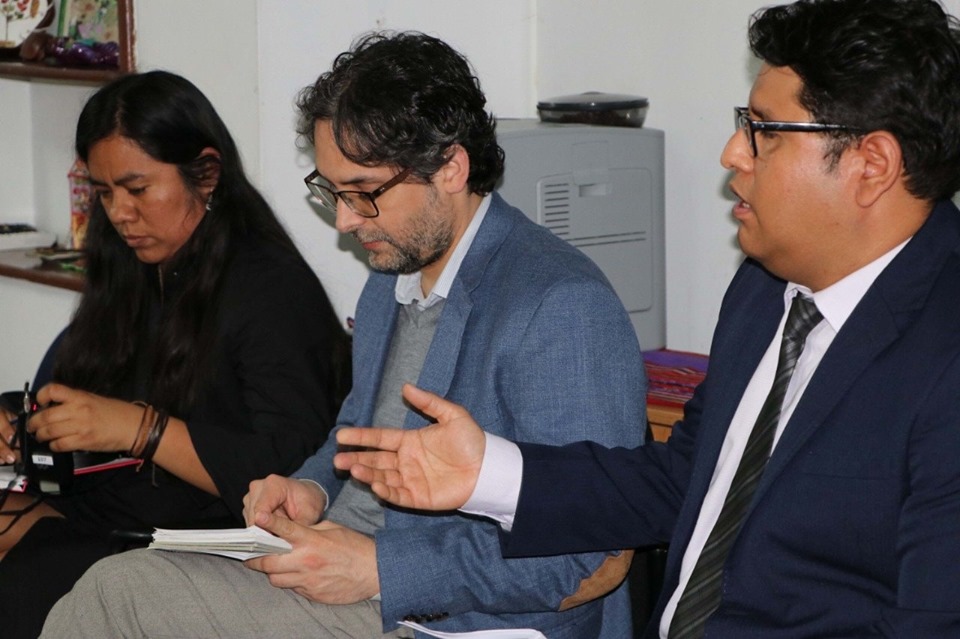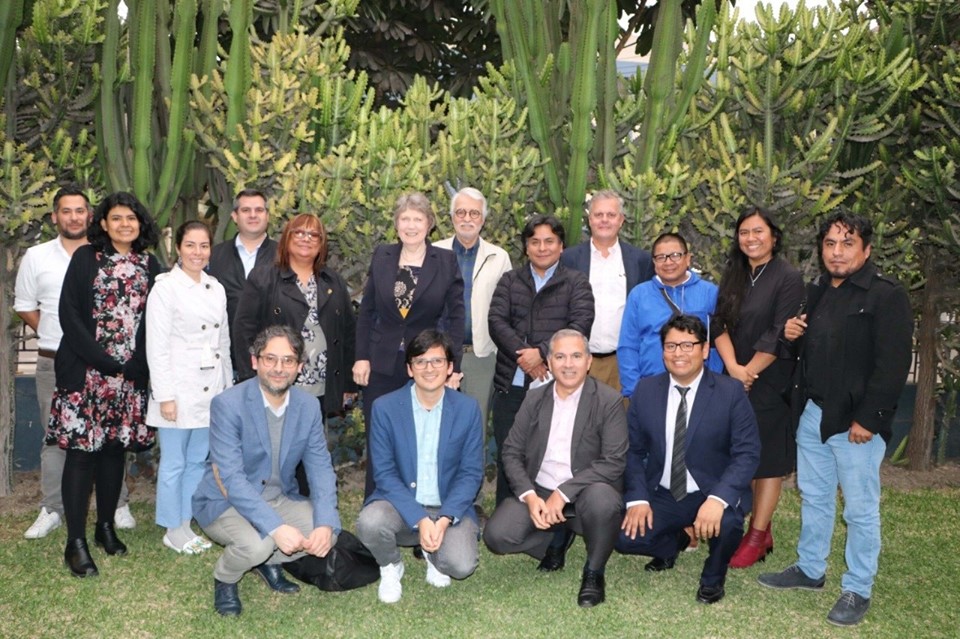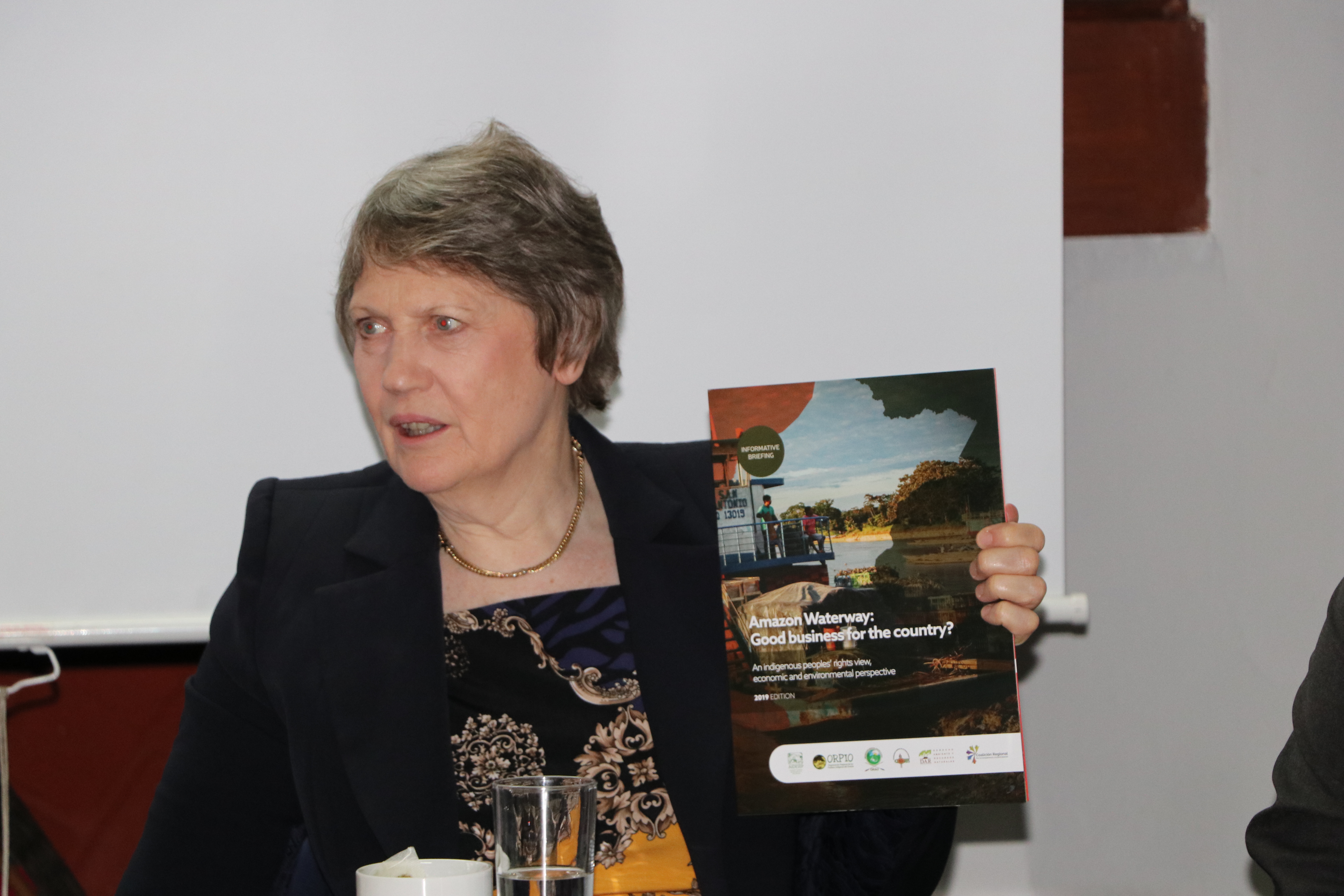- President of the Extractive Industries Transparency Initiative (EITI), met with civil society representatives and indigenous peoples in the framework of a roundtable organized by the civil association DAR and CooperAcción, both civil society members of Peru’s EITI National Committee.
- Helen Clark, former New Zealand’s Primer Minister and UNDP manager showed her concern over the development of the Amazon Waterway Project, which has several technical gaps.
Lima, October 10th, 2019.- Helen Clark, President of the Extractive Industries Transparency Initiative (EITI), in a recent visit to Peru, received a document signed by more than 30 civil organizations members of EITI from Latin America and the Caribbean, with proposals for the disclosure of environmental information, gender and labor, ethnic groups, artisanal and small scale mining, non-metal mining and local EITI. All during the framework of a discussion organized by the Civil Association DAR and CooperAcción, civil society representatives in Peru’s National EITI Committee.
Among the proposals stands out that all member countries of EITI should report environmental information on mining, oil and gas projects (including offshore) during the exploratory, exploitation and closure stages; make transparent information on environmental liabilities and impacts, as well as regarding the situation of risk and vulnerability of indigenous communities living with the extractive industry; and that prior, free and informed consultation, or any other decision or agreements made in those territories, among other proposals, be included in the EITI standard.
During the roundtable discussion, Clark pointed out that EITI member countries are facing today the challenge of adapting to the new EITI standard, which includes transparency of the environmental information and payments, contracts, and information on gender related to the extractive sector.
Clark also pointed out that corruption, in Peru and in Latin America, is a key aspect that must be addressed, particularly in the face of the “revolving doors” phenomenon that has been going on in the extractive sector in Peru. She also stated that it is necessary to review the structure of this initiative, so it isn’t just attached to the Ministry of Energy and Mines, and other sectors should be invited to participate such as Labor, Environment and Health, especially now that EITI requires that companies make transparent socio-environmental information.
Mark Robinson, Executive Director of EITI, and Francisco Paris, Director of EITI in Latin America, stressed the importance of passing on the information from the extractive industries sector to the local populations, so they can participate in the decision-making process of the sector.
Along these lines, César Gamboa, civil society representative to the EITI International Board, highlighted three challenges of this initiative in Latin America: make transparent the environmental impacts of the extractive industries; capitalize on their experience in transparency to help fight corruption; and become a tool for the local actors, reducing the distance between the local level and the current scope of the initiative.

In addition, César Flores, alternative civil society representative to the EITI National Committee, said that this initiative needs to broaden its framework for action, for example, not only by disclosing how much the extractive businesses contribute to the government, but how are these payments calculated, as well as making transparent the audited financial statements.
Automating Information
Vanessa Cueto, head representative of the national committee, emphasized a number of challenges in the framework of transparency, mainly achieving the transparency of social and environmental costs, as well as drafting timely reports and making local populations use the information in this initiative for decision-making within the framework of the development of extractive activities in their territories. In that sense, she remarked that since Peru’s National EITI Committee has been developing the automation process of the information disclosed by extractive companies and the government (with support from Grupo Propuesta Ciudadana), amore user friendly website, a communications plan to reach local populations and the inclusion of more socio-environmental information and environmental payments for the upcoming 7th National Transparency Report.
These advances would allow us to take a first step towards achieving a wider circulation of the initiative and respond to the information demands of the local population. However, as Cueto pointed out, after 15 years of Peru’s membership in the Initiative, it became necessary to make this commitment legally binding to disclose information and make these actions sustainable. It was also necessary the transparency of the social and environmental spending in the Oil & Gas sector, for which there is a commitment to EITI from the Ministry of Energy and Mines for the creation of a standard.

Furthermore, taking into account that the Oil & Gas industry has caused most of the impacts in Peru’s Amazon Basin, Jorge Pérez, president of the Regional Organization of Indigenous Peoples of the East (ORPIO), said that he considered necessary to understand EITI not only as an accountability project, but as an opportunity for the extractive industries to remedy their own impacts. It is important that EITI generates the appropriate channels for the involvement of indigenous peoples, and it remains a challenge to incorporate their organizations in the Initiative. Likewise, the CGTP (General Confederation of Peruvian Workers) representative, Ibis Fernandez, pointed out the need to improve the transparency of the employment situation in the extractive sector.
Finally, Helen Clark, former Prime Minister of New Zealand for three consecutive periods (1999-2008) and UNDP manager for two periods (2009-2017), expressed her concerns regarding the development of the Amazon Waterway Project because of the potential environmental and social impacts it could cause.
The roundtable was attended by representatives of DAR, CooperAcción, the indigenous organization ORPIO, Grupo Propuesta Ciudadana, CGTP, Amnesty International, the Pontifical Catholic University of Peru – PUCP, CIMA, TNC and NRGI.


